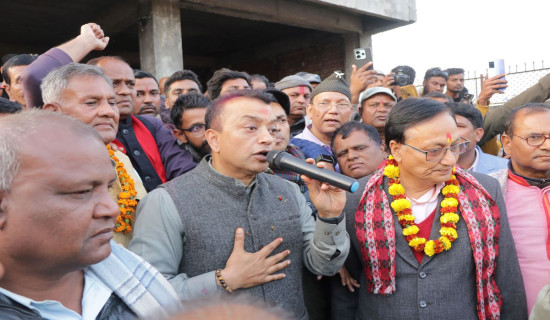- Tuesday, 27 January 2026
Check Rising Snakebites
Bini Dahal
BBC recently published a news report highlighting a rising number of snakebites in Bangladesh. According to the report, the country has witnessed a significant surge in the number of snakebites. Apparently, an approximate 7,000 people succumb to snakebites there annually. Keeping such a risky scenario in mind, the Bangladeshi government has pushed hospitals and health posts to stock anti-venom for the same. Timely administration of anti-venoms is considered a major way to increase the survival rates among the victims of snakebites.
And this case is no different from Nepal. With the onset of monsoon season, snakebites are now rampant in the country, especially the hot Tarai region. Snakes are cold blooded animals which are found being more active in warmer weather. A study conducted in March 2022 has demonstrated that every year around 2,700 people, mostly women and children, die of snakebites in the Terai region. However, in recent years, snakebite cases have become a common occurrence even in the hilly and mountainous regions of the country. It is alarming to hear about the sighting of a venomous sake species like the King Cobra in a place of Sindhupalchowk district, and Godawari of Lalitpur district.
This transition is a reflection of the growing climate change globally. Nepal is considered a highly vulnerable nation in terms of climate change effect in the world. The country is bearing the brunt of an annual average rise of temperature by 0.056 degrees Celsius. And research shows that a rise in every degree Celsius of daily temperature has the potential to raise snakebite cases by six per cent. This is really a matter of serious concern. In the country, snakebite has become an important issue within the public health domain. While this trend is getting highlighted more, it is equally important for the government and the concerned agencies to take necessary action to help prevent snakebites.
Creating awareness is essential to tackle this problem. Making services available is equally important. It is mostly women and children who are becoming the victims of snakebites. Through awareness, people will try to remain safe from snakebites and make desired efforts to seek medical assistance on time. The government must allocate enough resources so that required medical assistance is provided in a timely manner. However, it is noteworthy that and with an increasing demand for anti-snake venom, more snakebite treatment centres have been set up in the risker areas. The local governments have a vital role to play in controlling snakebites and providing treatment to the victims.
It is high time we became more alert of these extensions of the bigger problem, i.e., climate change. In this whole situation, it is not just us that get affected but snakes, which are important to the overall ecosystem. So, there is a big need to not just regulate the growing cases but also ensure the safety and protection of snakes, while providing necessary support to the people.
Amidst rising temperatures, there is a greater responsibility for the three-tier governments and the concerned stakeholders to take this matter seriously. Being in a vulnerable situation, Nepal must continuously strive to reduce the negative effects of the root problem on the lives of the people. This is also a great reminder for the developed countries globally to be mindful of their continued anthropogenic activities. Climate change and rising temperatures is making survival difficult bit by bit. As long as it is not addressed, we are bound to be unable to safeguard the lives of the vulnerable section of the society.
















